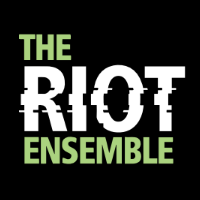A few moments with Arne Gieshoff
 The Riot Ensemble is gearing up for our upcoming Les Citations project, programmed in memory of Henri Dutilleux, with an array of premieres from around the world. One of the pieces coming from closer to home is from emerging composer Arne Gieshoff. Arne’s currently a Sound and Music Embedded composer with BCMG, and a fellow-member of the New Voices Scheme.
The Riot Ensemble is gearing up for our upcoming Les Citations project, programmed in memory of Henri Dutilleux, with an array of premieres from around the world. One of the pieces coming from closer to home is from emerging composer Arne Gieshoff. Arne’s currently a Sound and Music Embedded composer with BCMG, and a fellow-member of the New Voices Scheme.
I’ve known Arne’s music for a couple of years now. It’s a pleasure to have been able to commission and programme his new solo oboe piece Wucherung, and to ask him a few questions about his work in general. As with all the composers in this project, Arne will be with us at both Les Citations concerts so look for him if you’ve got any further questions on what he says here!
Aaron HN: Thanks for being with us Arne, and for your new solo oboe piece.
We commissioned this work for a project including Dutilleux’ Les Citations.
Did his music effect/influence you at all as you composed your new piece?
Arne Gieshoff: First of all, thank you very much for commissioning this piece! I’m very excited to be hearing Wucherung at the Forge next week. Rebecca is playing it brilliantly!
No, there is no direct relation between Dutilleux’s work – Les Citations in particular – and the oboe piece. However, his music has been a constant in my musical development and in that sense is influential on my compositional outlook. I sang the children’s voices part in a performance of The Shadow of Time something like thirteen years ago. This had a great impact on me and I guess the excitement for his music and contemporary music in general started around that time.
AHN: You worked closely with the oboist in writing this piece. Is that a normal part of your composing process, and what do you do differently in writing a piece when you’re working with a specific musician?
AG: Wucherung explores the lower register of the oboe and its microtonal capacity. Those sounds require specific fingerings which vary in their success to produce a certain pitch on different instruments. On that level it was invaluable to work with Rebecca – especially because it is a solo piece. It can often help to know who will be on stage in order to get a better grasp on the material without necessarily tailoring it to preferences beyond my own.
Wucherung is part of a cycle of works which also comprises the string quartet Unwuchten (‘imbalances’), verdreht (‘contorted’, ‘distorted’, ‘perverted’, ‘pixilated’, ‘wry’…) for Trombone, Melodica and Scordatura Melodica and Umschreibung (‘periphrasing’ / ‘alteration’) for chamber orchestra. In German, the term ‘Wucherung’ describes the uncontrolled growth of structures such as tumours.
AHN: Do you have a specific, daily routine for composing?
I have a daily routine but try to avoid a composing routine.
AHN: I think it would be fair to say that your music focuses on ‘musical’ parameters (pitch/rhythm/melody/form/etc…) eschewing extra-musical things such as noises (rustling paper, key-clicks, breath sounds, etc….) But composers are surrounded – both in everyday life and more and more in the repertoire – by sounds. Do they influence you and are they in any way significant for your compositional work?
While I acknowledge a difference between sounds produced by instruments which were built for that purpose and sounds stemming from unconventional sources, the divide is not that clear cut for me, and is not an idealogical one. I think the issue of anecdotal qualities of sounds is technical: the creation of a meaningful context for them poses different demands compared to conventional instrumental colour. However, for me all sounds have ‘musical’ potential and in the same way that the Lupophon hasn’t featured prominently in my work, a hoover hasn’t either. But this could change tomorrow.
AHN: What other projects are you working on/do you have coming up in 2014?
AG:Throughout the year I am Apprentice Composer-in-Residence with the BCMG as part of Sound and Music’s Embedded scheme and am spending time in Birmingham gaining insights into the ensemble’s work in preparation for a 2015 commission. I’ve also just finished Umschreibung for chamber orchestra (part of the same cycle as the oboe piece) which will be performed as part of the London Philharmonic Orchestra’s Debut Sounds Concert on 9 June at the Queen Elizabeth Hall, and have received a fellowship for the Tanglewood Music Center. I’ll spend the summer there studying as part of the composition programme and having a few works performed. In the Autumn The Ligeti Quartet will premiere my string quartet Unwuchten (also part of the cycle; commissioned by Anthony Bolton through Third Ear) at the Little Missenden Festival.
In addition to that, fellow composer Nicholas Moroz and myself are busy organising performances for explorensemble, a contemporary music group we run. On 23 June there will be a concert at the RCM featuring works by Sciarrino, Furrer, Romitelli and young composer Edwin Hillier. And in September we will be performing Fausto Romitelli’s Professor Bad Trip (Lesson I, II & III).



